#at least as old as Chaucer? that's ironic
Text
Tier Ranking All the Classics/”Literature” type Books I’ve Read
Or at least all the ones I remembered to include/didn’t arbitrarily decide to leave out. (Within each tier the books are not ranked)
Other books wish they had what these books have
(The best of the best. )
Crime and Punishment (Fyodor Dostoevsky)
A Tale of Two CIties (Charles Dickens)
Pride and Prejudice (Jane Austen)
The Lord of the Rings (JRR Tolkien)
The Chronicles of Narnia (CS Lewis)
Love it
Les Misérables (Victor Hugo)
East of Eden (John Steinbeck)- honestly I don’t remember much about it but I remember liking it a lot
Frankenstein (Mary Shelley)
Great Expectations (Charles Dickens)
The Great Gatsby (F. Scott Fitzgerald)
As I Lay Dying (William Faulkner)
Sense and Sensibility (Jane Austen)- but if I reread this might very well move up a category. Haven’t read it since I was like 11
Emma (Jane Austen)
Catch-22 (Joseph Heller)
The Hobbit (JRR Tolkien)
The Space Trilogy (CS Lewis)
Til we Have Faces (CS Lewis)
A Wrinkle in Time (Madeleine L'Engle)
It makes me think
(It’s not fun in the way you might think but it has really interesting ideas or elements that I enjoy engaging with)
The Brothers Karamazov (Fyodor Dostoevsky)
The Stranger (Albert Camus)
Night (Elie Wiesel)
Grendel (John Gardner)
The Sunflower (Simon Wiesenthal)
Confessions (Augustine of Hippo)
The Man Who was Thursday (GK Chesterton)
Orthodoxy (GK Chesterton)
Good Vibes Only
(I don’t really remember it but I remember liking it)
Remains of the Day (Kazuo Ishiguro)
Fahrenheit 451 (Ray Bradbury)
Hard Times (Charles Dickens)
Oliver Twist (Charles Dickens)
Persuasion (Jane Austen)
My Antonia (Willa Cather)
Really Enjoyable
Old Possum’s Book of Practical Cats (T.S. Eliot)- It’s absurd and a delight.
To Kill a Mockingbird (Harper Lee)
The Martian Chronicles (Ray Bradbury)
Cloud Atlas (David Mitchell)
Life of Pi (Yann Martel)
War and Peace (Leo Tolstoy)
The Crucible (Arthur Miller)
Hamlet (William Shakespeare)
The Color of Water (James McBride)
Beowulf
A Separate Peace (John Knowles)- Also featuring not one but two movie adaptations of the “so bad they’re funny” variety
Middlemarch (George Elliot)
White Fang (Jack London)- except the ending. Let White Fang stay wild.
Wuthering Heights (Emily Bronte)- they’re trash people doing terrible things and it’s a good time
And Then There Were None (Agatha Christie)
The Silmarillion (JRR Tolkien)
It’s good BUT
(I like it but there’s one glaring exception to that)
The Hunchback of Notre Dame (Victor Hugo) - Most of it is fun but also I’m pretty sure the one major plot point is very racist
Gone with the Wind (Margaret Mitchell)
yeah, it’s good
(I like it but not strongly)
The Jungle Book (Rudyard Kipling)
The Idiot (Fyodor Dostoevsky)
Macbeth (William Shakespeare)
The Possessed (Fyodor Dostoevsky)
Grapes of Wrath (John Steinbeck)
Moby Dick (Herman Melville)
Adventures of Huckleberry Finn (Mark Twain)
Paradise Lost (John Milton)
The Bean Trees (Barbara Kingsolver)- respect the fact that between when I read this as a high school freshman to when I read it as a student teacher, it worked its way up from “bleh) to be here
The Three Musketeers (Alexandre Dumas)
The Hound of the Baskervilles (Sir Arthur Conan Doyle)
Sure
(I feel slightly more positive than neutral)
Animal Farm (George Orwell)
Of Mice and Men (John Steinbeck)
The Scarlet Letter (Nathaniel Hawthorne)
Medea (Euripides)
Antigone (Sophocles)
The Odyssey (Homer)
David Copperfield (Charles Dickens)
Player Piano (Kurt Vonnegut)
That’s definitely a book that exists and I have read
(I have no emotions regarding this book)
The Portrait of Dorian Gray (Oscar Wilde)
Tarzan of the Apes (Edgar Rice Burroughs)
The Sun Also Rises (Ernest Hemingway)
Death of a Salesman (Arthur Miller)
Julius Caesar (William Shakespeare)
Passing (Nella Larsen)
Charlotte Temple (Susanna Rowson)
Jane Eyre (Charlotte Bronte)- I’m going to be honest. That category title is an exaggeration. I read a children’s abridged version when I was like 8 and that’s it.
Little Women (Louisa May Alcott)
Need to reread
(I feel like I missed something the first time through and would appreciate it more on reread)
Beatrice and Virgil (Yann Martel)
Song of Solomon (Toni Morrison)- honestly though I think rereading would move it to “respect but don’t like”
A Midsummer Night’s Dream (William Shakespeare)
Canterbury Tales (Geoffrey Chaucer)
I respect it, but I don’t like it
(I fully think that this is a quality book, but for some reason or another, I don’t like it)
The Plot Against America (Phillip Roth)
The House on Mango Street (Sandra Cisneros)
100 Years of Solitude (Gabriel García Márquez)
Bleh
Romeo and Juliet (William Shakespeare)
The Handmaid’s Tale (Margaret Atwood)
The Metamorphosis (Franz Kafka)
Bad Vibes Only
(I don’t remember this book but I remember I didn’t like it)
Heart of Darkness (Joseph Conrad)
A Portrait of the Artist as a Yong Man (James Joyce)
Rose in the Heart (Edna O’Brien)
Strong Dislike
1984 (George Orwell)- It could almost go into respect but don’t like, because I think the world he creates and the idea of it all is very well done. And the essay on NewSpeak is brilliant. But the book is boring and the characters are bad and I don’t really care if Winston gets tortured to death.
The Man in the Iron Mask (Alexandre Dumas)- There’s a reason why at least one movie adaptation looked at the plot and went “nah we’ll just write our own”. The first one is basically a swashbuckling adventure and then this one was like “hey want to see the musketeers sad and old and what if they went on one final mission which is deeply misguided where they all fail and die. Does that sound fun?” If I’m remembering it correctly.
“I can shoot the book physically but not conceptually and that makes me sad”
(I hate this book so much you don’t understand)
The Catcher in the Rye (JD Salinger)- this category was made specifically this book in mind.
#books#from your resident english teacher#tell me what I'm wrong about#or give me book recommendations#or you know ignore the massive ranking list no one asked for
11 notes
·
View notes
Text
The Dragon Prince’s Arthurian Connections
I’ve seen some connections made between The Dragon Prince and Arthurian legend before, but in the past, that was usually more of a cursory glance at BBC’s Merlin from 2008, comparing Soren and Callum to Arthur and Merlin, and also being an excuse to ship them. Whereas here, I want to genuinely examine the similarities between the characters.
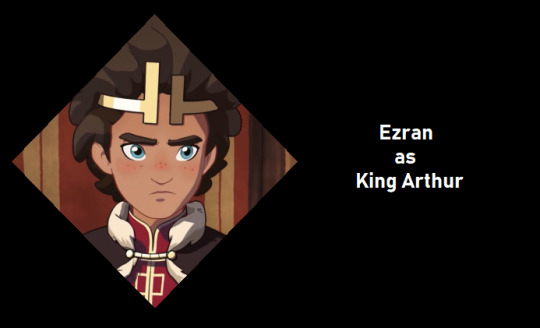
In the versions of stories where Arthur grows up in the royal palace, Arthur becomes king after his father is killed in battle when the prince is only 15 years old. Similarly, King Harrow is (at least assumed) to have died in combat with moonshadow elf assassins, leaving the very young prince as heir to the throne. While Arthur couldn’t talk to animals, Arthur is often toted as an example of a good, wise king, who put the needs of his subjects first, and ruled justly and kindly, just as we see Ezran do.

Aside from the obvious being a wizard thing, Merlin was a lifelong friend of both Uther and his son, Arthur. In some versions of Merlin’s backstory, Merlin’s father was an incubus who seduced a mortal woman, but she had baby Merlin baptised, cleansing him of his infernal ancestry. While we know very little about Callum’s father, if he’s intended to be ‘demonized’ as a negligent drifter who abandoned his family, this would loosely correlate to Merlin’s origins. Merlin was also a shapeshifter, and Callum learning to grow wings is a small but neat parallel. This could also mean that Callum’s role in Katollis will be to serve as an advisor to Ezran. He’s also older than Ezran, just as Merlin is always depicted as being older than Arthur.
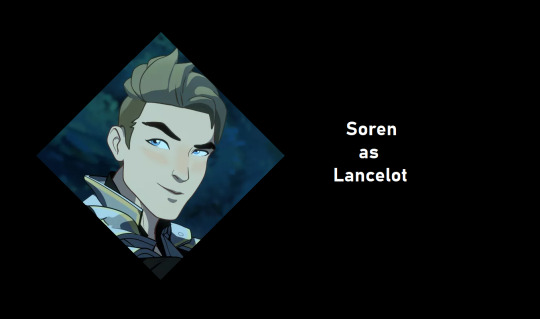
Lancelot is the bravest knight of the round table, and the best swordsman in Camelot.He is often Arthur’s most trusted knight, as Lancelot’s father supported Arthur’s claim to the throne of England after Uther’s death. Similarly, Soren is an elite member of the royal crownsguard, though I don’t remember if they say he’s just a number in the ranks, or the commander of the crownguard, but he’s also the youngest crownguard in history, which speaks highly of his skill and prowess in combat. He’s skilled enough to be entrusted with teaching the royal princes in swordfighting.

In early myths, Morgan is the kind enchantress ally to Arthur. In these older texts she’s actually not related to him whatsoever. Later adaptations spun Morgan from a fairy enchantress into a human witch, studying under Merlin with a voracious appetite for learning. Despite pop culture depictions, Morgan didn’t hate Arthur so much as she hated Guinevere. When Morgan was arranged to marry a man she couldn’t stand, she became quite... well-known among the young men of Camelot, and Guinevere discovered her liaisons and chastised her (how ironic), leading to a longstanding feud between Morgan and Guinevere. Morgan’s character shifts as the Arthurian myths evolve, and the kind fairy enchantress who helped Arthur slowly became the bitter resentful witch who turned to black magic on a path for vengeance and power lust, mirroring Claudia’s own fall from sweet goofball with a fondness for learning into a dark witch willing to sacrifice everything in the pursuit of her goals.
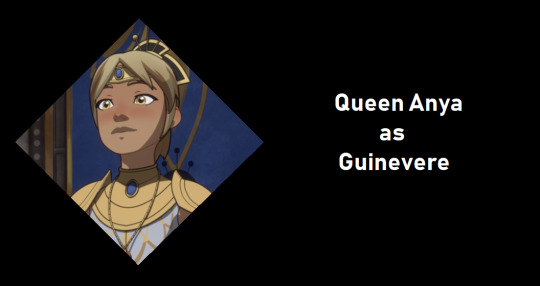
Now, obviously, the whole Lancelot/Guinevere tryst is made MEGA ewwwwww with this comparison, but if Ezran’s going to marry another royal, Queen Anya is the most likely candidate. She’s of a similar age, probably no more than a year or two apart, and some versions of Guinevere have had her be the brains behind the marriage. She’s proven herself to be clever and capable, and she seems to be a fan favorite character, so an arranged marriage between them doesn’t seem farfetched. Unfortunately, Guinevere really doesn’t tend to do much in Arthurian legends outside of the Lancelot stuff, so there’s not a lot of comparisons to make here. Um, in the Canterbury Tales, Arthur leaves all ‘women’s matters’ to his queen, meaning that if it’s a women’s rights issue, Guinevere gets final say in all legal rulings, so I guess that’s pretty cool and progressive of Chaucer which is... extremely ironic.

Arthur’s father, Uther, is the king before him. Uther dies in combat before Arthur ascends to the throne, but Uther has his own story. Namely, that he falls in love with a woman who is already married, and has with her a son, who becomes the half-sibling to a mage. Likewise, Harrow falls in love with Serai, a woman who has been married before, they have a son, and the prince’s half-sibling learns magic. In this scenario, Queen Serai is Igerna, but Igerna has little to no personality or plot to speak of, so I’m just lumping her into Harrow’s section. Uther is also important to the next character.

A lesser-known villain in the Arthurian mythos, most film adaptations ignore Vortigern because he’s not a villain of Arthur, but a villain of Uther. Vortigern is the royal advisor to Uther’s father Constans, and also his eldest brother, Maines. Vortigern manipulates Maines to make him look weak-willed and to turn public opinion against him. Vortigern then overthrows Maines with the favor of the people, leaving Maine’s brothers, Pandragon and Uther, to slay Vortigern and reclaim their kingdom from the wicked advisor. Pandragon ruled for a short while before dying without an heir and leaving the throne to his brother Uther, who took the surname Pendragon as homage to his dear brother. There’s also loose corelations with Mordred, the traitor who usurps the throne from Arthur when he’s busy declaring war on Lancelot for the whole infidelity fiasco.

While this connection is weak and loose, The Lady of the Lake (Evienne, Nimue, Vivienne, etc.) is a vaguely fey magical woman connected with a very specific lake. The Moon Nexus, which Lujanne guards, is also a very specific and important lake. While she hasn’t given Ezran a sword, nor did she raise Soren, the parallels do exist, however faintly.
#the dragon prince#tdp#the dragon prince season 3#ezran#callum#soren#claudia#harrow#serai#viren#lujanne#king arthur#camelot#katolis#katollis#king harrow#queen serai#king ezran#prince ezran#prince callum#arthurian legend#guinevere#lancelot#morgan le fey#morgana le fey#uther#uther pendragon#igerna#Igraine#vortigern
99 notes
·
View notes
Quote
On Monday, September 8, 1953, looking scrubbed, spruced, and more than the least bit intimidated, Paul, dressed in a navy blue blazer with a green badge over the heart, short gray trousers, a green-and-black-striped tie, and redoubtable dog’s-tongue cap, stumbled off the bus from Garston and walked up Mount Street and through the wrought-iron railing that delimited the yards behind the immense school building. Like most boys who crossed the threshold, he must have been swept with thoughts of smallness. The Inny was the largest building he’d ever entered, larger even than his mother’s hospital and almost as imposing as the mammoth Liverpool Cathedral, whose unfinished sandstone friezes loomed in eerie relief across the street. Nearly a thousand boys mingled in the lower yard, a sea of bodies, many of them seventeen or eighteen—grown men!—with serious features. [...]
Paul, slightly awed by it all, drew languages as his area of concentration, which seemed well suited to a boy with an ear for cadences. He began in the French stream but went on to do modern languages. “The first year, I was pretty lost,” he recalls. “But by the second year, I was learning Latin, Spanish, and German. At age twelve, which wasn’t bad.” Although spelling wasn’t a strong suit, and math even less so, he developed a particular knack for grammar and English literature, thanks in no small part to the influence of Alan Durband. Durband, known as Dusty to friends and colleagues, was somewhat of a celebrity at the Liverpool Institute, having written a short script for the BBC that was aired as a popular “morning story” on the radio. A disciple of the great literary critic F. R. Leavis, Durband brought the old rooted classics to life, beginning with Chaucer, which Paul read in its original Middle English, then trawled through Shakespeare’s plays. He responded strongly to the moral dilemmas faced by the characters, but he especially loved the way Alan Durband pared the stories down to their most basic themes, exposing the simplicity of it all. Indeed, Paul’s grasp of Durband’s lessons would be showcased in those early Beatles lyrics, deconstructing adolescent sexuality into pure sentiment (if not mere cliché): she loves you, I want to hold your hand, do you want to know a secret—small signs that what lay beyond might offer something more conceptual.
Fascinating as literature was, Paul found his firmest expression in art. “He had a real talent when it came to drawing,” remembers Don Andrew, another future Remo Four member, who sat next to Paul in class. “It wasn’t something he learned from a book, he was self-taught, and so the work he produced was truly imaginative.” Paul had drawn for as long as he could remember; he was “always sketching.” Come vacation time, he recalls, “I always [made] my own Christmas cards,” decorating them with nervous pencil sketches overlaid with watercolor washes.
Many years later he would linger in a Long Island barn and watch his friend Willem de Kooning “work on these massive, great canvases” that fed Paul’s own hunger to paint, but there was no such encouragement from the masters. At the institute, students never “stayed with art” throughout their school career; the meat-and-potatoes classes were so demanding that there just wasn’t enough time for it. But those boys who showed talent were given the opportunity to “stay behind on a Tuesday night” for extra art instruction. Once a week Stan Reed, the institute’s resident draftsman, conducted lessons in line and perspective drawing, as well as watercolors for a class of ten or twelve self-motivated students. Paul, who had energy, albeit conventional talent, flourished under Reed’s practical guidance. What’s more, Reed helped Paul overcome the insecurity he had in relation to “true” artistes at the art college next door—abnegating the notion “that they paint, and we don’t.” Paul took full advantage of the advice—so much so that, in time, some students actually approached him for tips and technical hints. Says Don Andrew: “I remember walking along the art room on Parents Nights, when our work was hung, and being drawn to the most outstanding piece on exhibit. It was always Paul McCartney’s—he was that good.”
bob spitz, the beatles: the biography
128 notes
·
View notes
Text
“You keep using that word...”
Well, not “keep using”, but why spoil a good quote for the sake of accuracy...? :->
This addition was from @musingmollusk at the bottom of an augmented reblog of her own post:
I’m not sure whether to feel flattered or intimidated that Peter Morwood rebloged my post with commentary and photographic references.
Gosh, I think... {:-P
The original post was a refutation of the bro-claim that “women can’t wear armour* because it was too heavy (!!!) and they were too weak”. Never met my Mum, did they? Or checked up on what armour outside games and bad fantasy fiction really weighs?
(*There’s a subclause, not mentioned: “But women CAN wear armour, if that armour is metal lingerie and not much of it because, umm mobility, umm distraction, umm...and we want to see some skin.”)

I presume both of these illustrations show matching class 6 Heavy Armor...
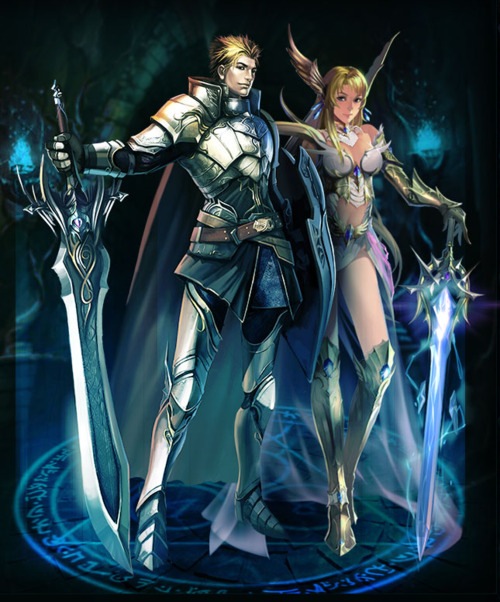
...with slight (cough) modifications for gender.
I’ll often compliment someone’s post (and indeed complement it with extra stuff). That just means the OP, or some additional comment, sparked a desire to add IMO hopefully-useful points on the subject, along with pics to prove those points.
Flattery is never intended. Why not?
Check its definition, or indeed read Chaucer - we did the "Nun’s Priest’s Tale*” at school when I was about 13...
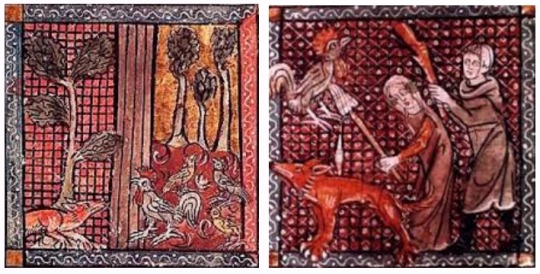
...and for a while “fals flatour” became a common insult, though it soon imputed flatulence more than flattery since keeping schoolboys away from toilet humour is like keeping iron filings away from a magnet...
(*The “Nun’s Priest’s Tale” is about 700 lines of mock-heroic beast-fable and a very, very early example of a romance hero getting too cocky. (It’s in a barnyard, there’s probably a gate somewhere...) Hard to avoid, given that Chanticleer is (a) a cockerel and (b) has an inflated opinion of himself and his voice. And they say old literature has no modern relevance!)
And I don’t think - at least I hope I’m not - intimidating!
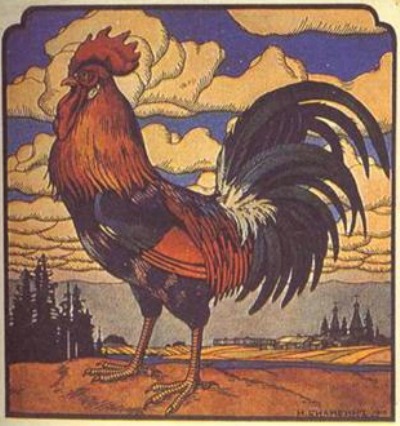
13 notes
·
View notes
Text
Reply to @AuroraQueenOfDreams
Replying here because, for some reason, her blog post cannot be reblogged (I suspect shadow-banning of the post itself).
“I'd say the "meanest" thing is the "poor provincial town" comment. Or the kind of snotty way she judges others as "little people" because... they have to work?”
Don’t forget her repeatedly saying “There must be more than this provincial life!”, doing so twice, three times if we count the reprise shortly after she gave Gaston a mudbath.
“Like, it's great you have the luxury of reading all day, Belle, but not everyone else has that privilege. Not everyone even has your education!”
Ironically, I’d argue the other villagers actually DO have her level of education, and I don’t mean that as a compliment on Belle’s part, since in the original film (pre-Special Edition that is), she’s only shown to be reading fairy tales, something which literally anyone who’s literate could read (and I absolutely refuse to believe that the other villagers are illiterate, since that bookshop would have gone out of business long ago if everyone save for Belle were illiterate.). Seriously, if you’re going to boast about having the luxury of reading all day, at least try to boast about reading advanced books like, I don’t know, Chaucer for example.
“I think a lot of fans see themselves in Belle- because that was almost certainly Disney's intention- and maybe that can make it hard to see her attitude as rude or snobby, but I don't see what's wrong with that as a flaw. We have reckless Ariel, temperamental Jasmine, overly trusting Snow, passive Aurora- I see other DPs get dragged all the time for their flaws but Belle's flaws or lack of always seems to be a controversial topic (along with Mulan, and Rapunzel, and Tia, and Elsa) even now while the Revival Princesses have largely taken her place as the best role models in critics' eyes.”
There wouldn’t be a problem with being rude or snobbish as a flaw... IF the story actually TREATED it as a genuine flaw on Belle’s part. Unfortunately, the story ALWAYS treats Belle as being in the right even when she actually isn’t (well, okay, probably the only real exception was when she exposed the Beast to the mob, though even there, I suspect that’s more because there was no way to justify it). Ironically, though, I’d argue Belle was a LOT more reckless than Ariel was overall. At least Ariel was shown to at least have some degree of street smarts when doing otherwise reckless actions (like when she implied she was fully aware of the risk of encountering sharks before plundering a ship when using reverse psychology on Flounder when he tried to fake sick), not to mention came across as exceedingly reluctant to enter that deal with Ursula (who had to fake reform just to convince Ariel to make the deal). Jasmine I’ll admit was temperamental regarding suitors, though at least there she had something of an excuse due to the suitors she got just being horrible, AND on top of that having to worry about an arranged marriage to worry about. Belle on the other hand was literally free to refuse Gaston due to not having to worry about an arranged marriage, yet STILL acted like a jerk to Gaston anyways.
“Although totally agreed she's definitely an angel compared to EmmaBelle, who is supposed to look better despite being very openly snobbish by way of comparison to the mean old bumpkin sexist villagers, which I just hate, because if you have to make someone cartoonishly bad to make me like your hero, maybe your hero isn't that nice. (Also, reading was NOT uncommon for women back then, Disney!)”
I wasn’t too happy with how they did the villagers in the remake, either (even if it DID at least give Belle an actual reason to want to leave the village beyond it being too provincial for her tastes). But on the other hand... the original film pushed that same crap with the villagers (even if not to the same degree), where they viewed Belle as “odd” simply because she read books (despite the fact that a fully functioning bookstore would suggest that most of the villagers were literate at least to some degree. Heck, them being implied to be Christians kind of makes literacy kind of required for them to even read the Bible). It really does irritate me especially when I had a history professor, Heather Lucas, I believe her name was, basically imply during one of her lectures that women weren’t even literate, let alone able to get an education or get jobs, until the 1960s when they “took power” on college campuses. Did I mention Lucas was a huge radical feminist almost to the degree of Linda Woolverton?
Besides, at least the remake actually avoids tarring Christianity as being advocates for keeping women illiterate (based on Pere Robert’s genuinely respectful treatment of EmmaBelle’s desire to read), unlike the original, where there isn’t really anything like that with any of the characters.
0 notes
Text
Boris Johnson and the Rise of Silly Style
On the world stage there are few national leaders who can compete with President Trump in the indelible image-making sweepstakes of the new social media order.
With his tangerine skin and white-circled sun-bed-goggle eyes, his candy-floss blond comb-over and too-long bright red ties and blowzy Brioni suits, he is a cartoon of a politician straight out of late-night TV: risible and seared into your retinas at the same time. It’s funny, until you realize it’s also unforgettable.
Emmanuel Macron with his neatly cropped hair and well-cut navy suits doesn’t come close. Nor does Justin Trudeau, despite his attempt to get creative with socks. Xi Jinping of China may have rocked his party by allowing his hair to grow gray, but globally he is entirely buttoned up.
Vladimir Putin’s off-duty uniform of bare chest and leather jacket screams mutant machismo, but he dresses by the rules at official public events. It’s possible that only Kim Jong-un, with his Mao suits and flattop bouffant, has reached the same level of absurd, yet effective, self-caricature.
Until Tuesday.
Until, that is, the members of the Conservative party of Britain voted two-to-one to make Alexander Boris de Pfeffel Johnson its new party leader, and hence set to be the prime minister.
And though he stood for his first speech as Tory leader in a spotless dark blue suit, his top jacket button firmly buttoned, a pristine white shirt and a sky blue tie only just slightly right of center, it is possible that Mr. Johnson trumps even President Trump when it comes to strategic use of a deceptively absurd image and sleight of sartorial hand.
He is certainly the only other head of government who has had multiple stories devoted to the evolution of his hair: a unique mop of very fine electric blond that has on occasion resembled a medieval bowl cut but more often is standing on end in confusion after having been tugged willy-nilly by its owner. It has even had its own Twitter account (@Boris_Hair) and conspiracy theorists (Boris Johnson Hair Truthers).
And it is possible that with the rise of both Mr. Johnson and Mr. Trump, it is time to start rethinking all traditional wisdom about what it takes to convince people that candidates are leadership material. Or at least that they look as if they are.
After all, attention to detail, the ability to control multiple variables at once, shoulders that can (ahem) shoulder the burden of office — qualities conveyed through the exactingly squared-off cut of a suit free from wrinkles and the polish of perfectly parted hair — were once considered crucial to electability but have been rendered seemingly irrelevant by the ascent of Mr. Johnson.
Since his government debut as a member of Parliament in 2001, his time as mayor of London (2008 to 2016) and foreign secretary, the adjectives often used to describe him include “shambolic,” “clownish” and “a buffoon.” His jackets are usually “rumpled” and flapping open, his shirts “spilling out,” his collars awry, his ties rarely on an even keel.
When he was mayor of London, he was famous for his eye-popping running outfits, which included a red beanie with an unzipped beige fleece and bright red and white Hawaiian shorts. Also what looked like silk boxing shorts with a giant dragon on the crotch. (Also for getting stuck on a zip line during the London 2012 Olympics while wearing a baby blue helmet, a blue and red harness, and waving two mini Union Jacks.)
These are clothing choices that would have, on most public figures, inspired ridicule and mockery to an extent that they might have subverted any faith in that individual’s ability to negotiate effectively during a G7 summit. On Mr. Johnson, however, they somehow became badges of credibility that bridged the class gap.
On the one hand, they spoke to what Sonia Purnell, the author of the biography “Just Boris: A Tale of Blond Ambition,” identified in her book as the mythic “English eccentric” (think the Duchess of Devonshire feeding her chickens in her evening dress).
On the other, they made the product of an otherwise elite upbringing — an international childhood, Eton, Oxford, languages that include ancient Greek — a figure of accessibility and affection: Yes, he looks like an idiot sometimes. But hey, don’t we all?
As a longtime fan of P.G. Wodehouse and Chaucer, and a student of history, Mr. Johnson surely understands the way bumbling plays in both the public mind and the British character narrative.
Nor could it have escaped him that, at least in recent history, this style has rarely, if ever, been adopted by those in power. Prime ministers like Tony Blair, David Cameron and even Gordon Brown were careful to button the top button to keep their suit lines straight when they were standing behind a podium, and they knew to sit on their jackets during an interview to make sure the shoulder lines stayed square.
Mr. Johnson lets it all sort of shuffle around. He doesn’t just break the boring old rules, he blows raspberries at them. His schlubbiness is both a product of his privilege and its antidote. It’s a balancing act that leaves his opponents at a loss.
When he embarked on the leadership competition, he seemed to toe the classic line more closely, apparently thanks to his girlfriend Carrie Symonds, who reportedly urged him to get a haircut and put him on a diet. Still he managed to show up at a Tory leadership debate in June with one of his socks inside out, a detail the British press — broadsheet as well as tabloid — seized on with great delight.
Now that he is about to move into No. 10, there’s no reason to expect any of this to change.
In the debate over whether his clowning is a sign of authenticity or pure genius calculation — or, most likely, a bit of both, in that he came by it naturally and then learned very quickly how to exploit it to his advantage — less has been made of its potential wider impact.
But in a world where casual Fridays, the pre-eminence of the tech uniform and the rise of street wear has freed everyone to de-stuff their suits, Mr. Johnson may be just the beginning. Are we in for an era of rumpled men?
After all, Bernie Sanders and Jeremy Corbyn, the leader of the Labour Party, deploy their dishevelment in strategic ways, each of them seemingly too passionate about the issues to iron. And while their physical sloppiness may once have been seen as reflecting a mental sloppiness, in an increasingly airbrushed and filtered world it telegraphs unvarnished truth telling and reality. It holds the allure of the anti-spin.
Even when it’s manufactured. Suddenly, looking like a mess looks to many awfully good. And when that happens, who really gets the last laugh?
Sahred From Source link Fashion and Style
from WordPress http://bit.ly/2MhLEen
via IFTTT
0 notes
Photo

I remember the day the light went on.

I have been told that using a colloquialism is an excuse for real words, but in this case, the words are exactly what they mean.
The light really did come on.
It was a regular school day...
...in a rural town surrounded by a large farming community where the local weather forecast eclipsed the importance of reading novels. Survival with hard physical labour for an unpredictable harvest understandably often out-weighed the value of the fine arts. Like my parents, I had little knowledge of 14th century Medieval classics.

An English Literature Class - Grade 11, I think.
The day is stored in my memory data as a photograph and a brief video.
Other students were in the class, but they are not in the picture.
Just me, Chaucer, and the teacher.
I never thanked this teacher, and she likely never knew how powerful her lecture was, at least for one student - me. Besides that one day with the ten-minute clip of the light coming on, I have no recollection whatsoever of being in any of her other classes I might have paid more attention, at least to her name, if I had realized that the light would never go out, and that both she and her teaching would matter so much some forty years later.
To be dedicating a whole article to this teacher and not even know her name is somewhat embarassing. Other teachers’ last names, like Barr, Sheets, and Jenkins, for example, are still embedded in my brain, but I cannot recall hers. She may have been Miss or Mrs., in those pre-Ms. days, and her surname might have started with the letter J. Lest she be unnamed, I will call her Ms. ? J.
Ironically, I remember how Ms. ? J. looked on that day. Tall and well-groomed, she wore pumps, possibly black, and a dark-coloured belted dress, tailored to fit snugly but modestly on her slender figure. I’m not sure why I noticed or still remember, except that her appearance seemed to command attention to detail and all matters of import.
I thought her to be somewhat austere in manner, but most likely she just took her profession and subject matter seriously and did not waste time on trivial conversations or silly hilarities. She was there to unfold the writings of Chaucer, after all.
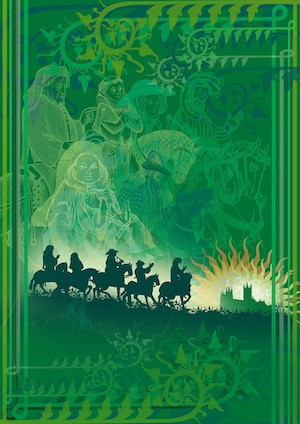
We were studying The Canterbury Tales by Geoffrey Chaucer.
I remember the title, at least, and the fact that there were a lot of characters in the story. Other than that, the words were as incomprehensible as a foreign language.
Ms. ? J. was lecturing, and I was listening, but not understanding.
Then she started to describe one of the fictitious persons in detail. The role and occupation of the character were apparently incidental, as I cannot remember either, although it may have been the parson or the cook. What I do remember is that the teacher showed how Chaucer looked beyond the person’s rank and title to see the real human being underneath the outward persona.
In words much fancier than mine, Ms. ? J. explained that the author did not directly tell us what the character was like. Instead, Chaucer elaborated on the individual’s appearance, conversation, interactions, and life experiences so that we, the readers, would be able to discern and understand the supposedly fictional person’s attitudes, personality, convictions, and character.
Suddenly, I got it, from my seat in the far left row next to the boring beige wall.While the teacher’s voice continued on in the otherwise silent classroom,I stared at her, mesmerized, from my sideways angle looking to the right, and believe I remained unmoving.
Inside my head, not just one light went on,but rather a cascade of colourful fireworks,exploding like lightning as new revelation ignited in my mind.
Chaucer and my teacher knew something I was just finding out: people are not defined by their roles and are not always what they seem.
I do not know how other members of my fellow human family come to this realization, but I had to be taught that I, too, could discover the stories behind story by observing people’s conversations, demeanour, and actions.
And then, just as abruptly, it was over. For all intents and purposes, I left the classroom the same as I entered,back into the oblivion of lost memories of the rest of that ordinary day.But, unknowingly, I had changed.

I tried harder to understand and asked more questions, even though the meaning of Shakespeare still seemed mostly unattainable. I have to confess that I did not turn into an avid reader of the classics, unless I can count all book and video versions of Pride and Prejudice by Jane Austen, of dubious classic repute. I did, however, become a serious student of human nature.
I no longer trusted my impressions of a person's rank or appearance and wanted to know how people felt when they told stories of their experiences and adventures. I paid more attention to authors and radio commentators who brought humour and insight into otherwise boring everyday life experiences: Erma Brombeck, Peter Szowski, Stuart MacLean, and David Barry.
I read magazine editorials and newspaper columns about people baking, graduating, going to medical appointments with a fatal disease, grappling with marital disharmonies, doing menial parental household chores, struggling to obtain eye glasses in an isolated northern community, trying to remember left and right, and how one student struggling with dyslexia became a renowned eye surgeon.
I started to understand that the obvious story-event was not as important as the more subtle sub-plots that revealed character strength or lack of it. I saw how others laughed at themselves and was inspired by those who felt deeply in crisis but somehow still coped.
Eventually, I surprised myself as I, too, was able to see and feel my own life experiences on multiple and sometimes complex levels. I learned to find the new stories in the story.
I don’t know what grade I got on on Chaucer’s Canterbury Tales in Grade 11 Old English Literature, but what I learned in my life-long test about understanding human nature greatly exceeded a measureable mark followed by a percentage sign.
For that, I am grateful.

Thank you, Ms. ? J.
Photo Credits: pixabay.com
Subscribe at http:subscribe.marilynnewbury.com
Originally published at https://www.marilynnewbury.com
0 notes